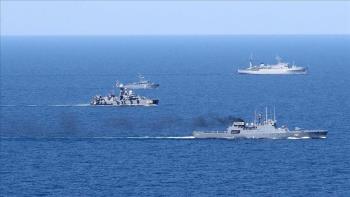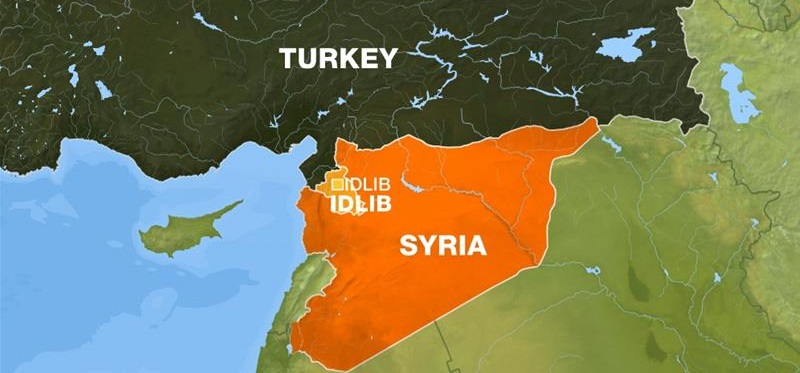Alwaght- The Idlib province has been the heart of the Syrian crisis since nearly a month ago. As the conflict nears its end with the sweeping victories of the Syrian army, backed by Damascus allies, the regional and international actors attempt to set their play cards in a way that allows the least chance for the rival parties to realize their plans in the war-hit country.
The various players’ weight and degree of influence are never equal in Syria. For example, the US, as a major backer of President Bashar al-Assad’s opponents, including the terrorist groups, has the least potentials and maneuvering power to play a role in the Idlib equations. However, Turkey, the supporter of the biggest bloc of anti-Assad forces which struggles to keep the northwestern province under the terrorists’ control, is the most important player in the crisis.
In the meantime, the Syrian government is making final preparations for the battle. While the government forces are at the highest level of readiness to recapture the province in a decisive battle, the armed groups and their foreign supporters are in the nadir of their capabilities to save Idlib under their control.
According to the latest reports surrounding the upcoming operation, the Syrian Arab Army has been deployed to several points, including southwestern Aleppo, eastern Idlib, northeastern Lattakia, and northwestern Hama ready to launch its offensive against a wide range of the terror factions holding the province for over three years.
In the meantime, Turkey has stepped up its diplomatic movement to prevent the Syrian government from starting the game-changing campaign.
The Turkish leaders’ push against the return of Idlib under the Damascus government’s rule comes as the province borders the Turkish territory. Idlib, with a size of about 6,100 square kilometers is bordering the southern Turkish province of Iskenderun. The province that fell to an alliance of armed groups, led by Jaysh al-Fatah and Tahrir al-Sham terrorist groups is now divided into three regions, with each militia bloc having its own rule over a part. One part is controlled by Ahrar al-Sham, loyal to Turkey and Qatar, while the other two are ruled by two various factions of Tahrir al-Sham alliance. To be more specific, Maarrat al-Nu’man, Ariha, Jabal Shahshabaw, Al-Habit, Banesh, Gorgnaz, Taftanaz, and the nearby villages are held by Ahrar al-Sham. Khan Sheikhun, part of Jabal al-Zawiyah, Kafr Nabl, Salgheen, Harem, Darkush, Jisr al-Sheghour, Sarmada, Idlib city, Sarmeen, and Maarrat Masreen are under Tahrir al-Sham's control. Small areas of the province, mainly in the south, are also held by ISIS terrorist organization.
Turkey’s behind-the-scenes game
The Turkish officials since mid-August launched a largely unsuccessful campaign of whitewashing the terrorist factions. Aiming to change the ground realities, they took pains to introduce the terrorists as moderate opposition, mainly affiliated with the Free Syrian Army which is widely recognized as the military wing of the opposition. The final aim is to strip the central government of legitimacy of the operation as an anti-terror one. According to reports, commanders of the Turkish army in northern Syrian met with Tahrir al-Sham and Turkistan Islamic Party and other terrorist parties on August 25 discussing a Ankara-proposed initiative to dissolve the groups and incorporate them in what Turkey calls moderate opposition such as Ahrar al-Sham with affiliation to the Muslim Brotherhood, an Islamist movement with roots across West Asia and under Turkey and Qatar patronage.
Indeed, Ankara leaders seek to Persuade Tahrir al-Sham, an extremist organization which was excluded from Russia-Turkey-brokered “de-escalation zones”, to disband in order to prevent the army from operation under the ruse of the possibility of a humanitarian crisis. But to Ankara's frustration, the Idlib field realities are unchangeable. In fact, even if the militias agree to disband, Damascus will not lose an international legitimacy to spread the rule of law across the country’s territories.
Limited choices and hard gamble
Ankara leaders are in a hard struggle to rebrand the terrorist groups in the contested province. But their choices are never various and pleasant. President Recep Tayyip Erdogan of Turkey has the difficult job of picking the best possible choice. The first option, which can be the worst and heavily costly for him, is fully supporting the terrorists, including a military intervention to prevent the Syrian army from advancing for a final cleansing of the region from the militiamen. Such a move can have three consequences: Ankara will be ejected from the Sochi and Astana peace initiatives. It will certainly decline to foil the operation as Damascus has the Russian and Iranian cover. And the final one is that Turkey could lose its foothold for swaying the Syria future equations.
Turkey’s resistance to return of central government’s rule to Idlib and other terrorist-held areas will halt the agreements Ankara reached with Moscow and Tehran. If things go to this direction, Ankara will turn out as the losing side. Because Syria itself has huge potentials and expects Russia and Iran to throw their weight behind its liberating campaign. Under this condition, Turkey can hardly stand in the face of the pressures or set up a new obstacle in the face of Damascus.
The second choice, thus, is the cooperation with the Russian-Iranian camp to find a solution just like engaging in Sochi and Astana processes after running into an impasse. This best suits Ankara interests as over the past few months it was in rifts with the US and Europe and so it cannot bank on a West and NATO's helping hand. The past experiences show that siding with Tehran and Moscow plays into Turkey’s hands. In 2016 and 2018, closeness to Moscow won Russia's tacit green light for operations, Euphrates Shield and Olive Branch, in northern Syria against the Kurds. Erdogan's facilitation of Idlib reclaiming is the most appropriate choice because by doing so he can secure a role in Syria future and repel the hazards endangering the Turkish borders with the north.



























